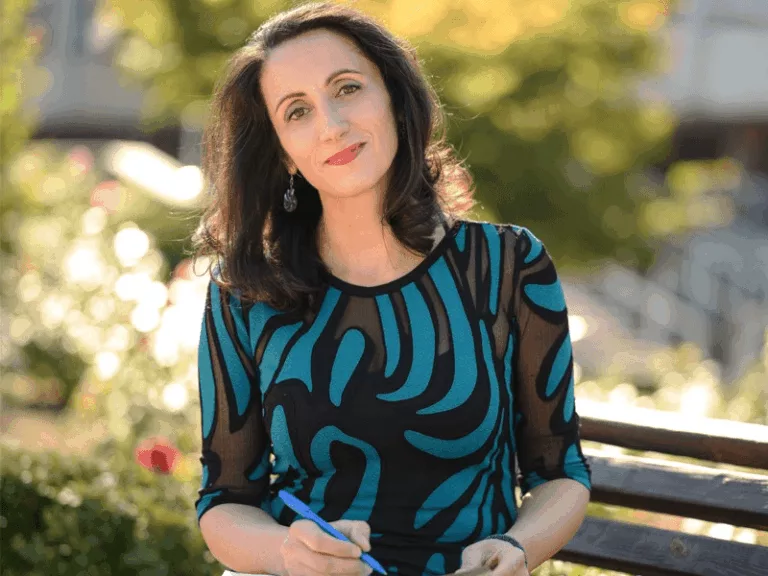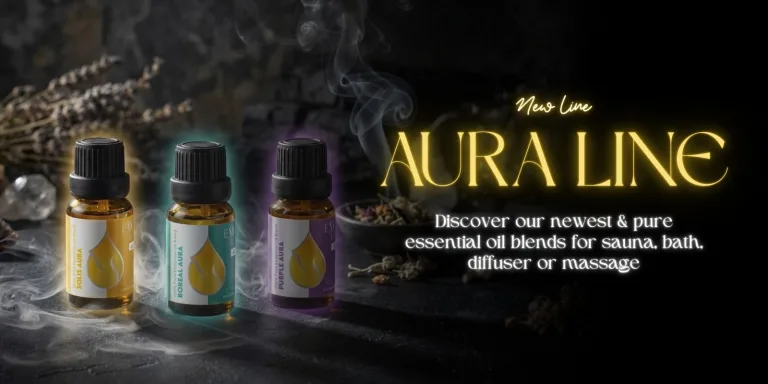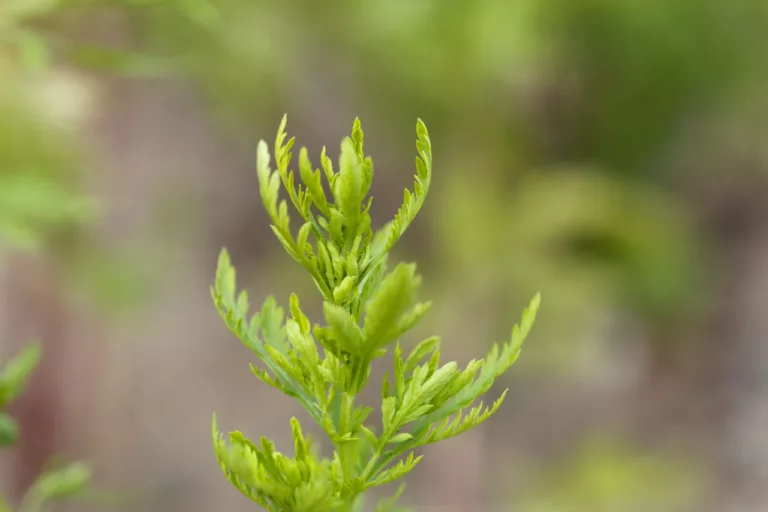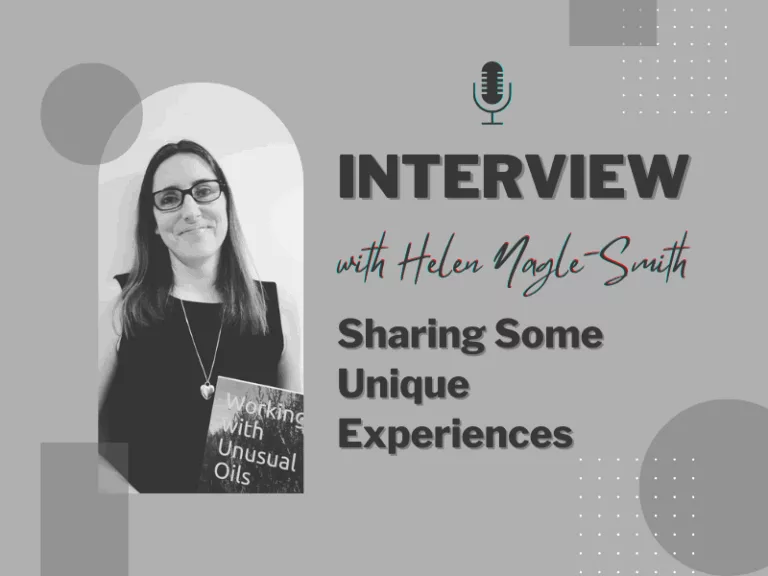Featured with Proletina Stoyanova

Learn about the most common mistakes when using essential oils and how to use them most effectively to help with various conditions, such as stress.
1. Who is Proletina in one sentence?
A seeker and researcher, in love with nature, plants, and the healing power we find in them.
2. Why did you choose to become an aromatherapist?
As can be said for any life vocation, usually it finds you – when you feel passionate about something, and the thought of it fills you with immense inner joy and gives you the strength to soar or move mountains. In choosing a profession, for me, it has always been important to have a cause – to see the result of my work at the end of the day, to work with the feeling that through it, I contribute, change, and help.
Many years ago, when I discovered the healing power of aromatic plants and realized how easy it was to maintain my family’s health without medicines, and when I saw how aromatherapy could transform our lives toward more ease – that’s when I decided to share it with others. This was how my path as an aromatherapist and instructor began.
3. What are the most common myths about essential oils?
The very word “aromatherapy” leads many people to perceive oils as a pleasant fragrant addition to spa treatments or as a modern way to scent rooms, laundry, or create a more pleasant atmosphere at home and at work. While they can certainly serve that purpose, their main role goes much further: they help restore imbalances in our body, mind, and emotions. We should think of them as plant extracts with powerful healing properties.
Essential oils are often perceived as dietary supplements to be ingested daily or used to flavor food and drinks. This practice carries significant risks due to the high concentration of active compounds in the oils and the possible adverse effects of such use. It is more appropriate to consider essential oils as medicinal substances, whose internal use is justified only when there are health indications.
Another incorrect belief is that because they are natural, unadulterated, and derived from plants, essential oils are completely safe for use, including ingestion. Can we say that about herbs and medicinal plants in general? We know that nature has many highly toxic plants, which are either not used or are applied in very limited quantities in herbal medicine. The well-known principle “the dose makes the poison” also applies to essential oils. Some contain highly toxic compounds for the human body, and their use is strictly limited.
Another very common myth is that there are different “grades” of essential oils on the market, such as “therapeutic grade” or “clinical grade,” and that others are somehow inferior. These are purely marketing tactics by some foreign manufacturers and suppliers. If an oil is produced according to the highest standards from a plant grown under optimal conditions and is not subjected to further processing, then it is suitable for therapy, regardless of the manufacturer or country of origin.
4. What are the most common mistakes people make when using essential oils?
People either apply oils undiluted on the skin or dilute them insufficiently, leading to unwanted reactions such as irritation or even allergic responses. Unfortunately, some allergic reactions are so severe that prolonged use of essential oils becomes impossible.
Another mistake is ingesting essential oils added to water, coffee, tea, or other beverages. Internal use, especially daily, is justified only for therapeutic purposes, with careful dose calculation, dilution in a carrier oil, and encapsulation designed for this purpose. This should be done under the guidance and supervision of a qualified clinical aromatherapist and is not recommended at home without the necessary knowledge.
Another risky practice is the daily use of essential oils in high doses through various methods – rubbing into the skin, inhaling, or ingesting – without planned breaks. The risk is overloading the body and unwanted reactions. Overdosing reduces the otherwise wonderful therapeutic effects of the oils and can cause adverse consequences.
Parents using essential oils on their children, especially infants and young children, must know that proper dosing is crucial and not all essential oils are suitable for children. It is a mistake to use all oils on children or in doses intended for adults.
The undeveloped child’s body and thin, sensitive skin react much more strongly to the high concentration of essential oils. My recommendation to parents is to consult a professional before applying essential oils to their children or to learn from a trusted source how to do it both effectively and safely.
5. Which essential oils can help with anxiety and stress? How do essential oils act on hormonal imbalances?
Inhaling essential oils and diffusing them into the air is the easiest and most direct way to affect conditions related to unproductive stress and anxiety. Aromatherapy massage is also an excellent method to reduce tension in both the body and the mind. Oils with proven effects in this regard include lavender, clary sage, ylang-ylang, vetiver, neroli, frankincense, citrus oils such as orange, mandarin, bergamot, grapefruit, and any oil that, for the individual, induces relaxation and pleasure.
The aromatic molecules of inhaled essential oils reach the brain’s limbic system as neural signals, stimulating different brain centers such as the pituitary, hypothalamus, and amygdala. These centers begin secreting specific neurochemicals, producing targeted effects on both the physical body and the psychological state. This mechanism also explains how inhaled essential oils influence hormonal balance.
It has long been known and proven that certain essential oils can normalize the functioning of endocrine glands and positively affect hormonal disorders. For example, they can regulate reproductive hormone imbalances in women and reduce or eliminate symptoms of PMS, pre-menopause, and other menstrual disturbances, including associated emotional states. Various mechanisms are responsible for these effects.
Addressing hormonal imbalances first requires reducing daily stress and tension, and achieving a calmer approach to life. Here, aromatherapy’s benefits are undeniable.
In addition, the body needs support to eliminate excess hormones or waste products that interfere with normal gland function, strengthen the liver, and normalize digestion and metabolism. Essential oils have powerful specific effects in this regard. They can be applied in multiple ways – on the body, added to bathwater, diffused for inhalation, or used as compresses, among others.
6. You conduct professional training and personal consultations. What is your next goal?
I have long observed trends and developments in the sector. Essential oils continue to grow in popularity, the market for these products is expanding, and yet their use is specialized and requires at least a minimal level of knowledge for safe and correct application.
These trends encouraged me to expand and deepen the trainings I have been conducting for nearly ten years. I found support and a serious partner in Christina Hristova, a certified clinical aromatherapist. Together, we expanded the existing aromatherapy school into the first Aromatherapy Academy in Bulgaria.
Alongside the main course in aromatherapy and aromatherapy massage, we developed additional specialized courses for therapists, focusing on the chemistry of oils and aromatherapy applications for different human body systems. Along with the scientifically oriented “Western” approach, we incorporated essential knowledge from traditional Chinese medicine, reflecting our understanding of aromatherapy as a holistic healing art.
The next steps involve expanding the Academy’s offerings to meet the specific interests and needs of various professionals and to provide shorter, focused courses on particular topics for a broader audience.


